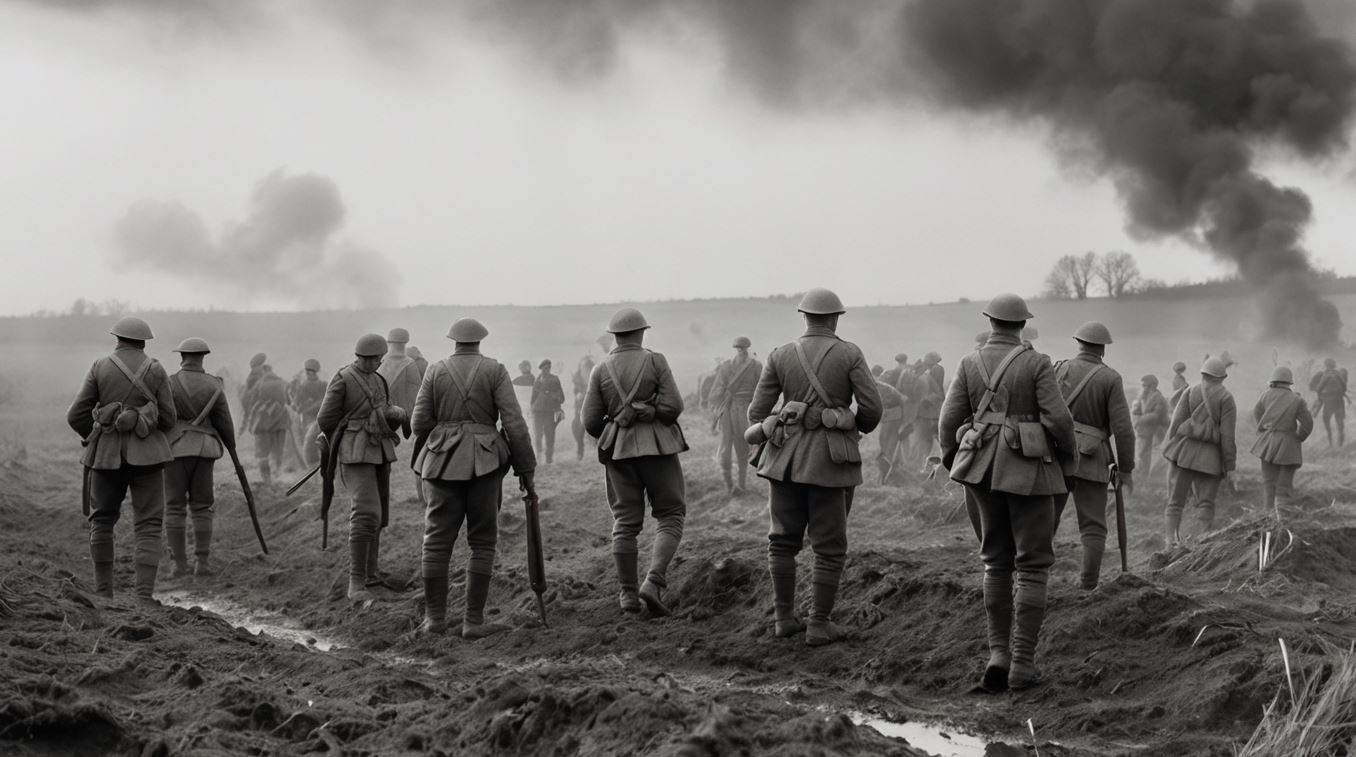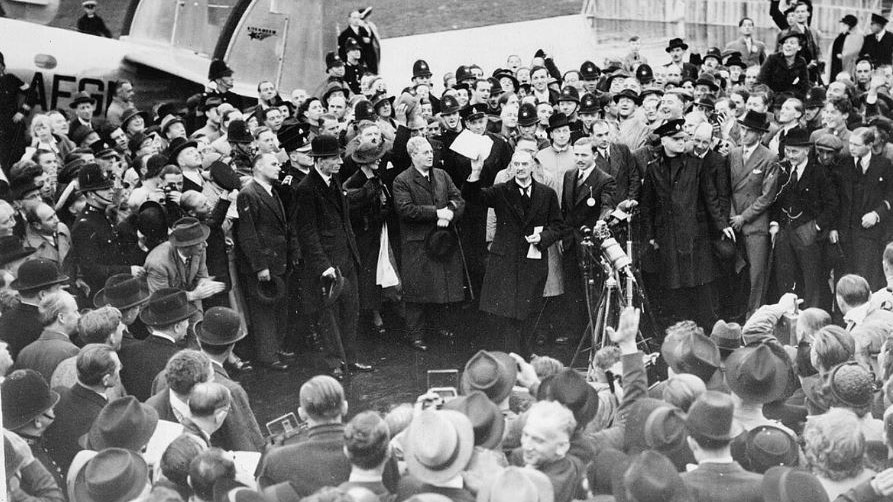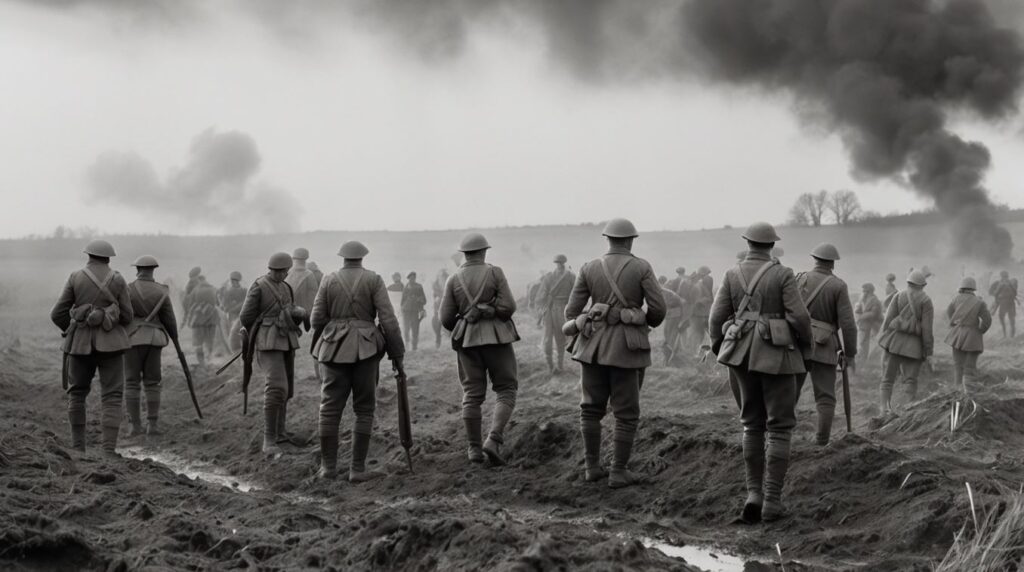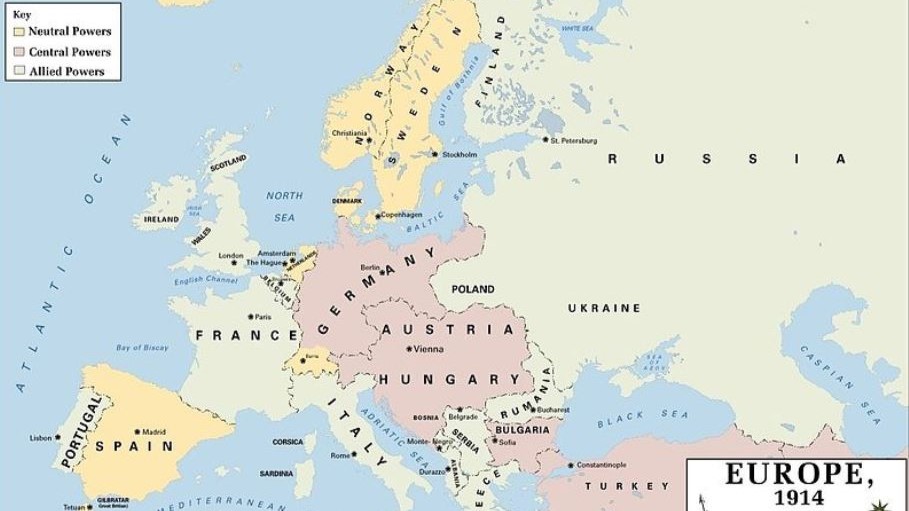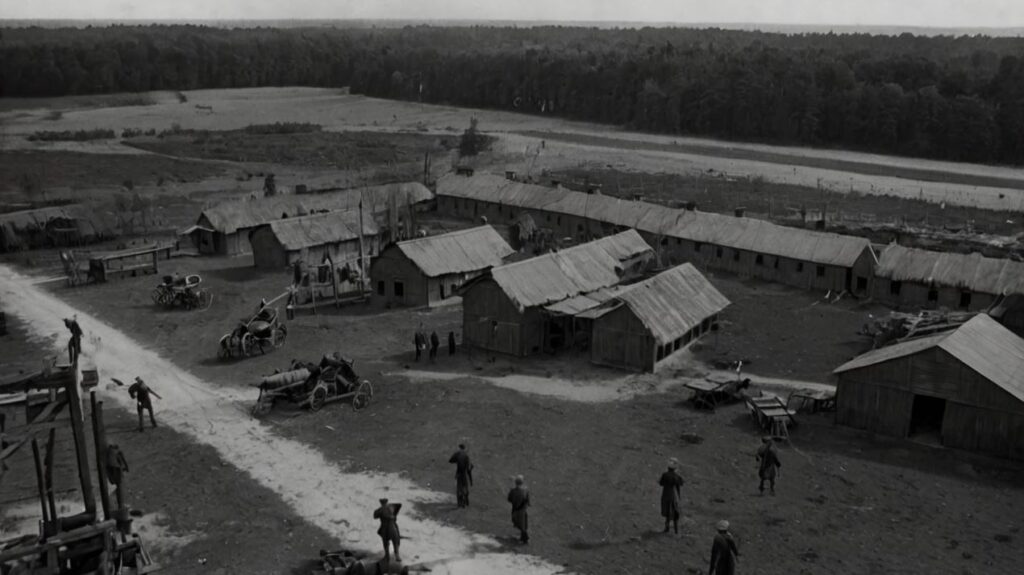World War I was a conflict that reshaped the global landscape. But what if one of its key opening moves had been different? Let’s explore an alternate history scenario where France, not Germany, was the first to invade Belgium in 1914.
- 1. Background: France at the outbreak of World War 1
- 2. What would have been Britain's response to a French invasion of Belgium?
- 4. What would be the German Reaction to a French Invasion of Belgium?
- 5. Belgian Resistance Against France
- 6. Public Opinion
- 7. Could France Have Achieved a Quick Victory by Invading Belgium?
- 8. Long-term Consequences of French Invasion of Belgium
- Final Thoughts: What if France invaded Belgium in WW1 first?
- Further Reading
1. Background: France at the outbreak of World War 1
Before delving into this hypothetical scenario, it’s crucial to understand the political climate in France during the Third Republic (1870-1940).
This era was marked by political instability, frequent changes in government, and a growing sense of nationalism.
France also harbored deep resentment towards Germany following the loss of Alsace-Lorraine in the Franco-Prussian War of 1870-1871.
France’s strategy at the start of World War I was centered around Plan XVII, developed by General Joseph Joffre in 1913.
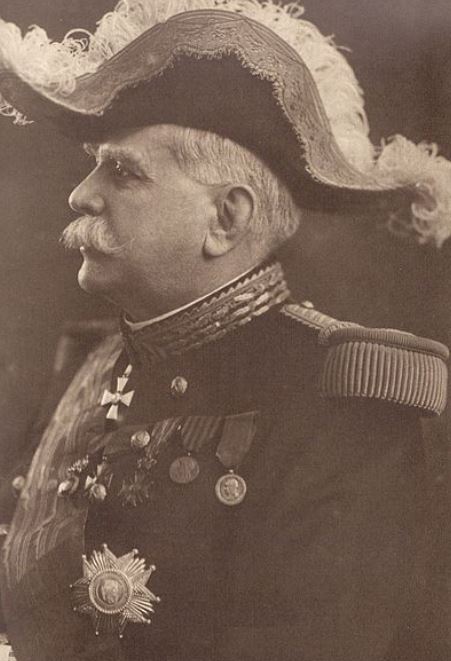
This plan called for an aggressive offensive against Germany, primarily focused on reclaiming the lost territories of Alsace-Lorraine.
Key elements of Plan XVII included:
- Concentrating troops along the German frontier, with only a small force on the Belgian border.
- Launching immediate offensives into Alsace-Lorraine and the Ardennes.
- Relying heavily on the offensive spirit and élan of French troops.
- Underestimating German strength and their use of reservists.
The plan had significant flaws, including inadequate defense of northern France and outdated tactics like massed infantry charges. When implemented in August 1914, it led to heavy French casualties and failed to achieve its objectives.
By mid-September, the failure of Plan XVII contributed to the transition to trench warfare on the Western Front.
In this alternate timeline, we’ll assume that a more aggressive, nationalist government has come to power in France, perhaps led by a charismatic figure in the mold of General Georges Boulanger.
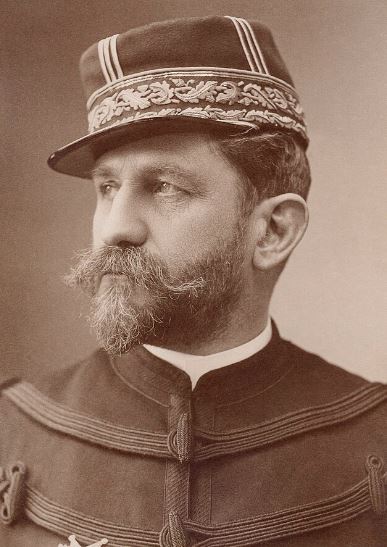
This government, emboldened by its alliance with Russia and confident in its military strength, decides to strike first against Germany, using Belgium as a route to outflank German defenses.
2. What would have been Britain’s response to a French invasion of Belgium?
Britain’s response to this French aggression would be a critical factor in shaping the course of the war.
Historically, Britain entered the Great War to defend Belgian neutrality against German invasion. In this scenario, they would likely still oppose the violation of Belgian neutrality, but their response might be more measured.
Initially, Britain might attempt to resolve the situation through diplomatic channels.
They could issue an ultimatum to France, demanding the immediate withdrawal of French forces from Belgian territory. This approach would give France an opportunity to reconsider its actions without immediately escalating to full-scale war.
While pursuing diplomatic solutions, the UK would likely begin mobilizing its forces.
The Royal Navy would be put on high alert, ready to intervene if necessary.
The British Expeditionary Force (BEF) might be prepared for deployment, but its destination would be uncertain – they could be sent to defend Belgium against France, rather than fighting alongside French forces as they did in our timeline.
Anglo-French Relations following a French Invasion
The French invasion of Belgium would put severe strain on the Entente Cordiale, the series of agreements that had fostered friendly relations between Britain and France since 1904.
This diplomatic understanding had been a cornerstone of European politics, and its potential collapse would have far-reaching consequences.
Given the shock of French aggression, Britain might initially adopt a position of armed neutrality.
They would likely condemn the French action but might hesitate to immediately join the conflict on either side. This period of neutrality could give Britain time to assess the situation and potentially broker a peace deal.
If France refused to withdraw from Belgium, Britain might find itself in the uncomfortable position of aligning more closely with Germany. While full alliance would be unlikely given long-standing rivalries, there could be a degree of cooperation in opposing French aggression.
4. What would be the German Reaction to a French Invasion of Belgium?
In this scenario, Germany would likely adopt a defensive posture, at least initially.
Instead of implementing the Schlieffen Plan (which in our timeline involved invading Belgium to outflank France), they could fortify their western border and prepare to repel a French attack.
Germany would have a significant propaganda opportunity, portraying itself as the defender of small nations against French aggression. This could help improve Germany’s international image, which historically suffered due to their invasion of Belgium.
Germany might offer military assistance to Belgium, leading to an alliance between the two nations. This would give German forces a legitimate reason to enter Belgium, not as invaders but as defenders against French aggression.
5. Belgian Resistance Against France
As they did against Germany in our timeline, the Belgian army would likely mount a determined defense against French invaders.
The fortifications around Liège, which historically slowed the German advance, would pose similar challenges to French forces.
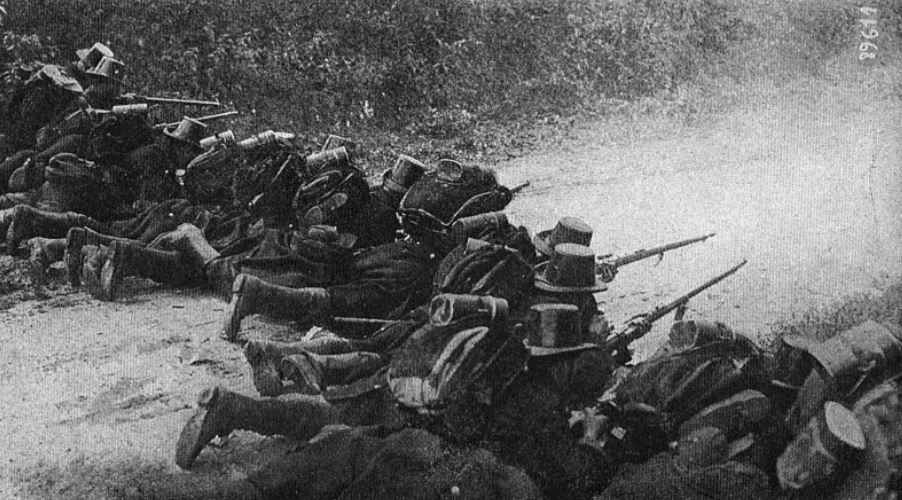
The Belgian population, fiercely proud of their independence, would probably engage in widespread resistance against French occupation. This could take the form of sabotage, intelligence gathering for the allies, and even guerrilla warfare.
If French forces managed to occupy a significant portion of Belgium, King Albert I and the Belgian government might be forced into exile, possibly in the UK or the Netherlands. From there, they could continue to rally international support and coordinate resistance efforts.
6. Public Opinion
French aggression against a smaller, neutral nation would likely shift international sympathy towards Germany and Belgium. This could have significant implications for how other nations viewed the conflict and chose to align themselves.
Countries that remained neutral in our timeline, such as the United States, might view France and its allies less favorably. This could affect their willingness to provide loans or sell supplies to the Entente powers, potentially altering the economic dynamics of the war.
Within France, the invasion of Belgium might initially be met with patriotic fervor among nationalists.
However, as the conflict dragged on and casualties mounted, anti-war sentiment could grow more rapidly than it did in our timeline, particularly if France was seen as the aggressor.
7. Could France Have Achieved a Quick Victory by Invading Belgium?
France would likely face similar challenges to those Germany encountered in its historical invasion of Belgium.
The Belgian fortifications, particularly around Liège, would slow their advance. Moreover, the French army of 1914 was not as well-prepared for a war of movement as the German army, potentially leading to early setbacks.
Germany, fighting on the defensive, would have several advantages.
- Prepared Positions: Instead of rushing through Belgium as per the Schlieffen Plan, Germany could fortify its western border. They’d have time to construct extensive trench systems, artillery positions, and other defensive works along the Franco-German border and potentially within friendly Belgian territory.
- Shorter Supply Lines: Defending closer to home would significantly shorten German supply lines. This would allow for more efficient distribution of troops, ammunition, and other resources compared to the logistical challenges they faced historically when invading Belgium and northern France.
- Use of Terrain: Germany could make full use of favorable defensive terrain, particularly in Alsace-Lorraine and the Ardennes. These areas are hilly and forested, providing natural obstacles to an attacking force.
- Flexible Response: With interior lines of communication and an extensive rail network, Germany could quickly shift troops to respond to French attacks. This flexibility would make it difficult for France to achieve a decisive breakthrough.
- Conservation of Manpower: Defensive operations typically result in fewer casualties than offensive ones. By adopting a defensive posture, Germany could potentially preserve its manpower better than France, which would be suffering losses in offensive operations.
- Technological Advantage: German forces could make full use of defensive technologies like machine guns and rapid-fire artillery, which were more effective in defense than in attack during this period.
- Morale Factor: German troops would be fighting to defend their homeland, potentially boosting morale and fighting spirit.
- Time for Mobilization: A French offensive would give Germany more time to fully mobilize its forces, including reservists, without the pressure of simultaneously conducting an invasion.
- Opportunity for Counterattacks: From a strong defensive position, Germany could launch powerful counterattacks against exhausted French forces after failed assaults.
- Political Advantage: Being in a defensive posture could help maintain domestic support for the war effort and potentially improve Germany’s international image.
This defensive posture would make it extremely challenging for France to achieve the quick, decisive victory they might have hoped for. The French army of 1914, trained primarily for offensive operations, would likely struggle against well-prepared German defenses, potentially leading to high casualties and limited territorial gains for France.
8. Long-term Consequences of French Invasion of Belgium
This scenario would fundamentally alter the narrative of World War I.
In a scenario where France invaded Belgium at the start of WWI and subsequently lost the war, postwar politics in France would likely be dramatically different from our historical timeline. Here’s an exploration of what postwar French politics might look like:
Political Instability
- Collapse of the Third Republic: The failure of such an aggressive military strategy would likely lead to the fall of the government and potentially the entire Third Republic system.
- Frequent government changes: Even more political instability than in our timeline, with rapid turnover of governments as different factions blame each other for the defeat.
Rise of Extremist Movements
- Far-right resurgence: Nationalist and revanchist movements might gain popularity, blaming the defeat on internal enemies and calling for a stronger, more authoritarian state.
- Communist influence: The left might also gain strength, especially if economic conditions worsen, potentially leading to attempts at socialist revolution as seen in Russia.
Anti-War Sentiment
- Pacifist movements: A strong anti-war sentiment might emerge, with pacifist parties and organizations gaining significant support.
- Isolation tendencies: There might be a push for France to withdraw from international affairs and focus on internal issues.
Economic Challenges
- War reparations: France might be forced to pay significant reparations, leading to economic hardship and political resentment.
- Loss of colonies: France might lose some or all of its colonial empire, further damaging its economy and national pride.
Constitutional Reform
- Decentralization: Some regions might push for greater autonomy or even independence in the wake of the central government’s failure.
Foreign Policy Shifts
- Rapprochement with Germany: Depending on the peace terms, there might be efforts to improve relations with Germany to avoid future conflicts.
- Distrust of Britain: If Britain opposed France during the war, it could lead to long-lasting animosity and a reorientation of French alliances.
Cultural Impact
- “Lost Generation”: A disillusioned generation of writers, artists, and thinkers might emerge, critically examining French society and values.
- Revisionist history: Efforts to explain or justify the invasion of Belgium might lead to historical revisionism and debates over national identity.
This altered political landscape would likely be characterized by instability, extremism, and a fundamental questioning of France’s role in Europe and the world. The exact outcome would depend on many factors, including the severity of the defeat, the terms of peace, and the ability of French society to adapt to dramatically changed circumstances.
Final Thoughts: What if France invaded Belgium in WW1 first?
I firmly believe France was right not to invade Belgium at the start of World War I. Such an action would have been a catastrophic strategic error.
Invading neutral Belgium would have immediately cast France as the aggressor, squandering the moral high ground they held in reality.
This move would have severely strained, if not destroyed, the crucial alliance with Britain, potentially pushing them towards neutrality or even alignment with Germany.
Militarily, France wasn’t prepared for the mobile warfare required for a successful invasion through Belgium. They would have faced determined Belgian resistance, logistical difficulties, and the risk of overextension. Moreover, this would have allowed Germany to adopt a strong defensive posture, negating France’s advantage of its fortified eastern frontier.
Politically, such an aggressive act would have been deeply divisive within France, potentially leading to internal unrest and governmental instability.
The “what if” scenario of a French invasion of Belgium serves as a stark reminder of the importance of respecting international law and the potential consequences of unchecked aggression. France’s actual course of action – maintaining the moral high ground, relying on alliances, and trusting in their defensive capabilities – was indeed the best path forward.
Further Reading
I hope you have found this blog post about What if France invaded Belgium in WW1 first? interesting. To find out more about World War 1, read here:
- The Haunting Russian Zombie Legends of World War I
- White Friday: A WW1 Tragedy on the Italian Front
- Militarism, Alliances, Imperialism, Nationalism: The MAIN causes of WWI
- Germany’s World War 1 Turnip Winter
- Did Any Civil War Veterans Serve in World War 1?
You may also enjoy these articles exploring ‘What If’ scenarios:

